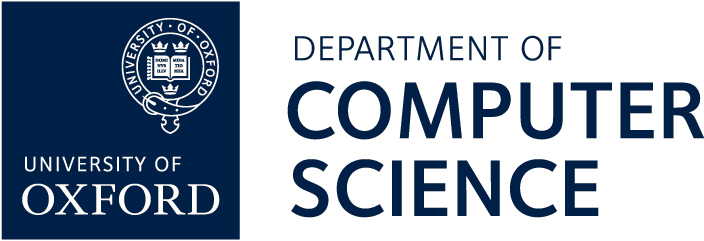A SECOND COURSE IN
THE QUANTUM THEORY OF INFORMATION AND COMPUTATION
Weeks 3-8, Trinity Term 2010
Lectures by: Jacob Biamonte, Stephen Clark, Mark Williamson and Vlatko VedralProblems class tutor: Shane
Mansfield
|
 |
|
(and Warmup Sheet) |
|
|
Aims and Objectives
Quantum theory has become a multidisciplinary field, with each sub-field using their own notation and techniques to solve problems that apriori appear different. By unveiling common underlining structure and by providing a uniting notation and language, this course will follow the spirit of Oxford Style Quantum Theory.Assuming minimal prior background, our focus is to introduce the basic connections between information, computation, and condensed matter physics. In simple terms and by building on fully worked examples, those attending will be exposed to a higher mathematical language which will help bridge the gap between an introductory quantum information processing course and what's needed to read current literature.
Recommended Prerequisites
Any introductory course covering basic aspects of quantum information will do, in particular, any one of:- Introduction to Quantum Information Processing, Oxford Materials
- Quantum Theory and Quantum Computers, Oxford Mathematical Institute
- Lasers and Quantum Information Processing, Oxford Physics
- Quantum Computer Science, Oxford Computing
Laboratory
Practicals
There will be one practical in week 5 providing a hands on introduction to using Matlab to solve Schrodinger's wave equation.- See the notes section for source code
Synopsis
Mathematical formulation of qubit quantum theory, Quantum Circuits as String Diagrams, basic applications of Lie algebras and Lie groupsHamiltonian Models of Quantum Computation, Quantum Channels, Entanglement, Applications of Categories, Stabiliser Formalism, GHZ states
Quantum Complexity Theory, Lattice Models, Integrable Systems, Duality Transformations as String Diagrams, Open Quantum Systems
Theory of methods to simulate quantum systems, Variational Methods, introduction to DMRG and Tensor Network States
Quantum Algorithms to Simulate Physics and Chemistry, Adiabatic and Ground State Computing
Reading
- Kitaev, Shen, and Vyalyi, Classical and Quantum Computing, AMS, (2001).
- Nielsen and Chuang, Quantum Computation and Quantum Information, CUP, (2000).
- Hannabuss, Introduction to Quantum Mechanics, OUP, (1997).
- Vedral, Introduction
to Quantum Information Science, OUP, (2006).
- Vedral, Decoding Reality
Date, Time and Venue
In TT 2010 these lectures will be held in (see the google map to Lecture Theatre B, Comlab):
- Biamonte, Williamson and Vedral
attend QuantumBio in Boston 6/17 to 7/1
|
|
|

